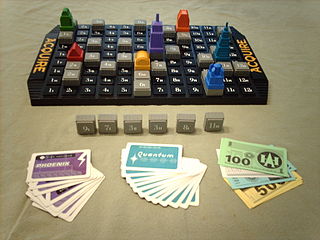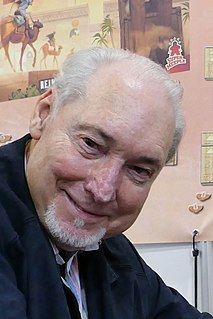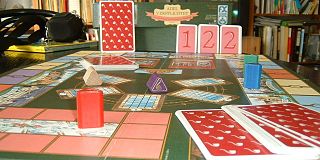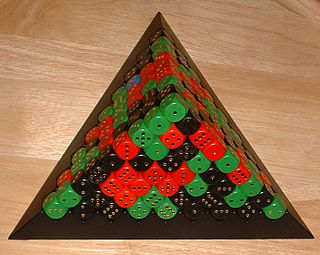
Acquire is a multi-player mergers and acquisitions themed board game. It is played with tiles representing hotels that are arranged on the board, play money and stock certificates. The object of the game is to earn the most money by developing and merging hotel chains. When a chain in which a player owns stock is acquired by a larger chain, players earn money based on the size of the acquired chain. At the end of the game, all players liquidate their stock in order to determine which player has the most money. It was one of the most popular games in the 1960s 3M bookshelf game series, and the only one still published in the United States.

A Eurogame, also called a German-style board game, German game, or Euro-style game, is a class of tabletop games that generally has indirect player interaction and abstract physical components. Eurogames are sometimes contrasted with American-style board games, which generally involve more luck, conflict, and drama. They are usually less abstract than chess or Go, but more abstract than wargames. Likewise, they generally require more thought and planning than party games such as Pictionary or Trivial Pursuit.

The Spiel des Jahres is an award for board and card games, created in 1978 with the purpose of rewarding family-friendly game design, and promoting excellent games in the German market. It is thought that the existence and popularity of the award was one of the major drivers of the quality of games coming out of Germany, particularly in the 1980s and 1990s. A Spiel des Jahres nomination can increase the typical sales of a game from 500 to 3,000 copies to around 10,000; and the winner can usually expect to sell to as large as 30 million copies.

Reiner Knizia is a prolific German-style board game designer.

El Grande is a German-style board game for 2-5 players, designed by Wolfgang Kramer and Richard Ulrich, and published in 1995 by Hans im Glück in German, by Rio Grande Games in English, and by 999 Games in Dutch. The game board represents renaissance-era Spain where the nobility fight for control of the nine regions. El Grande was awarded the Spiel des Jahres prize and the Deutscher Spiele Preis in 1996.

Wolfgang Kramer is a German board game designer.

Hare and Tortoise is a Eurogame designed by David Parlett in 1974 and first published by Intellect Games. In 1978 it was released by Ravensburger in Germany, where the game became a huge hit. It has since sold some 2 million units in at least ten languages, including several known pirated editions. The current edition is published by Gibsons Games in the UK, Ravensburger in Germany and Rio Grande Games in the United States.

Hoity Toity is a board game created by Klaus Teuber in 1990.

Imperial is a German-style board game designed by Mac Gerdts in which the object is to accumulate wealth in the form of bond holdings in successful countries and cash. Players take on the role of international financiers who purchase government bonds in the six pre-World War I empires of Austria-Hungary, France, Germany, Great Britain, Italy, and Russia. The principal bondholder of a nation gains control of its government and can order importation or production of armaments and ships; maneuvering of military units; construction of factories; and taxation. During play, an investor card is passed around which allows the purchase of additional bonds. A rondel – a wheel-shaped game mechanism with eight different options – is used to determine the options available to a country. The game box states that it is for 2–6 players, but a developer-supported variant allows play with seven. Imperial 2030 is a follow-up game released in 2009 with similar mechanics.

The Game is a dice game designed by Reinhold Wittig. It was first published in Germany in 1979, without rules and under the German name Das Spiel.

Agricola is a Euro-style board game created by Uwe Rosenberg. It is a worker placement game with a focus on resource management. In Agricola, players are farmers that sow, plow the fields, collect wood, build stables, buy animals, expand their farms and feed their families. After 14 rounds players calculate their score based on the size and prosperity of the household.
This page lists board and card games, wargames, miniatures games, and tabletop role-playing games published in 2009. For video games, see 2009 in video gaming.
Imperial 2030 is a German-style board game designed by Mac Gerdts and published by PD-Games and Rio Grande Games. It is based on the rules of the 2009 game Imperial.

Dixit, is a French card game created by Jean-Louis Roubira, illustrated by Marie Cardouat, and published by Libellud. Using a deck of cards illustrated with dreamlike images, players select cards that match a title suggested by the "storyteller", and attempt to guess which card the "storyteller" selected. The game was introduced in 2008. Dixit won the 2010 Spiel des Jahres award.
A rondel is a wheel-shaped game mechanism with a number of different options. A rondel game is one in which a player's choice of actions is limited by their ability to move around the rondel, and so the player is restricted from taking the same action repeatedly. A player is usually able to move farther around the rondel by paying a cost.

Splendor is a multiplayer card-based board game, designed by Marc André and illustrated by Pascal Quidault. It was published in 2014 by Space Cowboys, Asmodee. Players are gem merchants of the Renaissance, developing gem mines, transportation, and shops to accumulate prestige point. The game was nominated for Game of the Year in 2014 Spiel des Jahres. Mobile application version of the game, both iOS and Android, was published by Asmodee Digital.

Colt Express is a railway-themed family board game designed by Christophe Raimbault, Illustrated by Ian Parovel and Jordi Valbuena, published in 2014 by Ludonaute and distributed by Asmodee.

Deus is a Civilisation-themed board game designed by Sébastien Dujardin, illustrated by Ian Parovel, Maëva Da Silva, Christine Deschamps & Paul Laffont, published in 2014 by Pearl Games and distributed by Asmodee.
Just One is a cooperative party game for 3 to 7 players, designed by Ludovic Roudy and Bruno Sautter and published by Repos Production in 2018. In each round of the game, players write down a one word clue for the round's guesser, who must figure out the secret word for the round. Identical clues are discarded before the guesser sees them.















